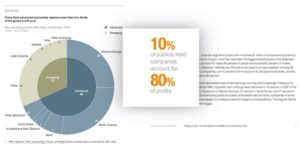

This interesting video explains that while the world economy has recovered from the 2008 economic collapse, wages are still only growing at the rate of inflation; that is half of what they were growing before the Great Recession. 

Historically firms increased profits by increasing productivity through training and development but in 2010’s profits are being expanded through technology. Typically in a busy economy “full employment” is reached and wages increase as employers compete for skilled staff. Today companies buy more automation and concentrate wealth.
The question is what to do about this inequality?
It is easy to become scared of the robots and automation but full Artificial Intelligence is still a long way off. The “SkyNet” computer take over of 

A more pressing issue is the concentration of wealth in the hands of the very small number of large companies and the investor class. The charts on the right show:
Put simply the numbers show that tech giants are doing what society has told them to do; make as much profit as possible by using as little labour as possible.
Large companies and governments used to recognize the importance of a healthy middle class, but it appears that Canadian and American corporations no longer do. Short term profits are what make these companies tick.
A second important factor in this discussion relates to corporate responsibility and how it just does not seem to apply to tech firms.
Ford almost went bankrupt when they knowingly produced a relatively small volume unsafe car named the Pinto. Firestone almost went bankrupt when they produced a very small percentage of faulty tires.
Compare those situations to tech firms. Consumers of tech giants products seem unconcerned about their treatment:
Somehow, tech companies seem immune from the historic rules of business ethics.
Combine these two facts (concentrated profits with a limited respect for customers), and we have a crisis in the making. If this situation does not change in the coming decades, we look at a future of civil unrest.
This website uses cookies.